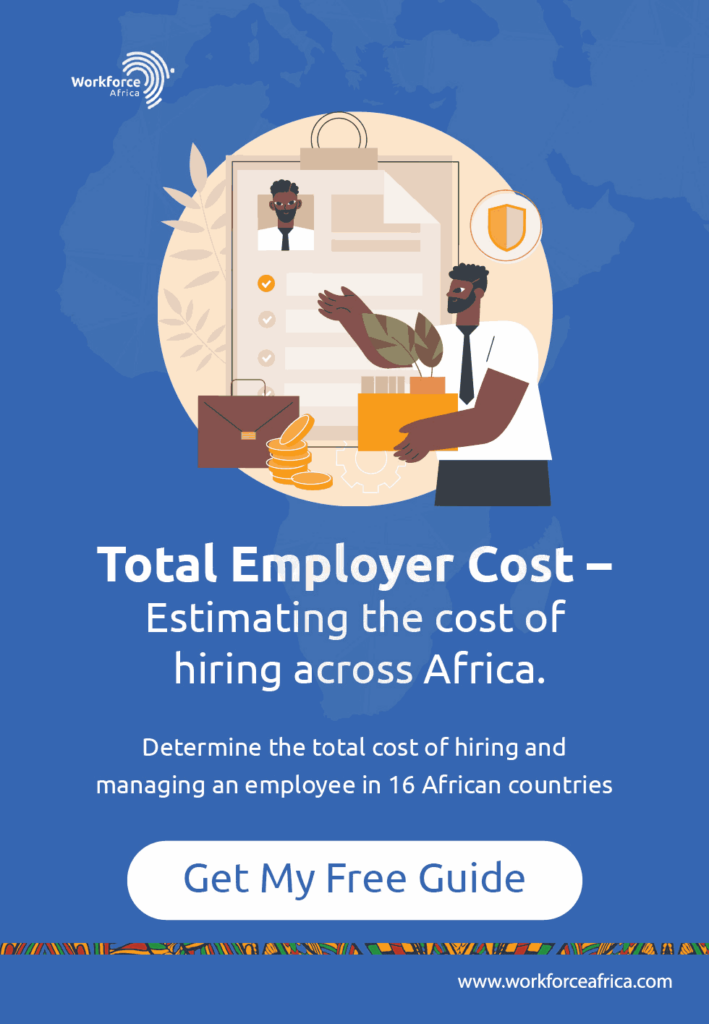
- hello@workforceafrica.com
- +234 816 305 6589
- +234 903 194 6744

This article is of significant importance as it explores leveraging Africa's remote workforce potential while preventing burnout.
It highlights strategies for maintaining employee well-being, ensuring peak productivity, and maximising Africa's advantage in the global market.
Africa's talent pool is not just a rising star, but a potential powerhouse in the global remote work landscape.
Companies are increasingly recognising the untapped potential of skilled professionals across the continent. However, with this exciting opportunity comes a crucial responsibility: employee well-being.
This article, 'Maximising Africa's Productive Advantage:How to Avoid Work Burnout for Remote Employees,' delves into strategies for fostering a healthy work environment for your remote African team.
By prioritising well-being, we can unlock Africa's full potential for innovation and productivity, propelling businesses and individuals towards a thriving future.
Recommended Post: How to Navigate Compensation for Remote Employees in Africa Compliantly
Africa boasts a vibrant talent pool for remote work but harnessing its potential hinges on employee well-being.
A crucial aspect of this is identifying burnout before it significantly impacts productivity and team morale
Here's how to recognise potential burnout in your remote African workforce
Reduced Engagement
Burned-out employees often need to improve their enthusiasm for work. This can manifest as missed deadlines, decreased meeting participation, and a general lack of motivation.
Deteriorating Communication
Clear and consistent communication is vital in remote work. If an employee becomes withdrawn, responds slowly to messages, or avoids communication altogether, it could signal burnout.
Shifting Work Quality
A hallmark of burnout is a decline in the quality of work. This may include increased errors, missed details, or a need for more attention to previously maintained standards.
Negative Emotions
Remote work can make it harder to detect emotional cues, but tone or content changes can be telling. Watch for increased irritability, cynicism, or negativity directed towards work or colleagues.
Work-Life Imbalance
Burnout often blurs the lines between work and personal life. Due to work-related anxieties, employees may constantly check work emails outside of work hours, struggle to detach, or experience disruptions to their sleep patterns.
By being mindful of these indicators, you can proactively address potential burnout in your remote African team.
Early intervention through open communication, flexible work arrangements, and encouragement to utilise available resources can help maintain a healthy work environment, maximising productivity and staff well-being.
Africa's remote workforce presents an exciting opportunity for businesses, here is how to avoid burnout while working from home as it is essential for maximising this advantage.
Leaders play a pivotal role in managing tasks and fostering a well-being culture that keeps employees engaged and productive.
Create a safe space for open communication. Encourage regular check-ins, both formal and informal.
This ensures that every voice is heard, and every problem is addressed, fostering a sense of understanding and support.
Promote healthy boundaries between work and personal life. Respect employees' off-work hours and discourage constant availability. Consider flexible work arrangements to accommodate different schedules and time zone
Collaborate with your team to set clear goals and expectations. Recognise and celebrate achievements, both big and small. This fosters a sense of purpose and accomplishment, boosting morale and motivation.
While geographical distance exists, fostering a sense of team spirit is crucial. Organise virtual social events, team-building exercises, or online game nights to encourage interaction and connection.
Provide access to resources that promote mental and physical well-being.
This could include online fitness programs, subscriptions to meditation apps, or encouraging breaks for physical activity.
This, however, contributes to how to avoid burnout while working from home.
Leaders can also be role models for healthy work habits. Setting clear boundaries with your work hours and encouraging breaks sends a solid message to your remote team.
By prioritising well-being and actively mitigating burnout, leaders can cultivate a thriving remote environment that unlocks the full potential of Africa's workforce.
Africa is a rising star in the remote work revolution. However, with the flexibility of remote work comes the potential for burnout if it is not managed effectively.
This guide equips you, the African on how to avoid burnout while working from home to maintain a healthy work-life balance and maximise your well-being
Establish a Dedicated Workspace
Carve out a specific area in your home for work. This physical separation helps establish clear boundaries between work and personal life.
Set Work Hours & Stick to Them
While remote work offers flexibility, create a work schedule and stick to it as much as possible. This helps maintain a sense of routine and prevents work from bleeding into your time.
Communicate Effectively
Remote work relies heavily on clear communication. Proactively communicate your schedule, availability, and progress to avoid misunderstandings and ensure timely task completion
Prioritise Breaks & Disconnect
Getting burnt out while working remotely is common. Scheduling regular breaks throughout your workday to step away from your screen, stretch, or engage in a non-work activity.
Avoid checking work emails or messages outside of your designated work hours. You are constantly improving on ways on how to avoid burnout while working from home
Maintain Social Connections
Remote work can be isolated. To combat loneliness, schedule virtual coffee breaks with colleagues, join online professional communities, or participate in virtual co-working sessions.
Embrace a Healthy Lifestyle
Prioritise your physical and mental well-being. Get enough sleep, eat healthy meals, and engage in regular physical activity. Consider online fitness programs or local exercise groups to stay active.
Remember, open communication with your manager is critical. Discuss your workload, voice any concerns about burnout, and explore strategies to manage stress.
You can thrive in Africa's dynamic remote work landscape by taking charge of your work environment and prioritising self-care.
Maximising Africa's potential in remote work demands a cultural shift within organisations.
While leaders play a crucial role, fostering a work-life balance for your African remote team requires a commitment from both employers and employees. Here's how to embed work-life balance into your company culture
Leaders set the tone. When managers prioritise their own well-being and disconnect during non-working hours, they send a powerful message to employees.
Recognise that one-size-fits-all approaches rarely work. Offer flexible working hours, remote work options, or compressed work weeks to accommodate individual needs and circumstances.
Shift the focus from "face time" to achieving results. Measure performance based on defined goals and completed tasks, allowing employees to manage their time effectively.
While communication is vital, after-hours emails and messages can disrupt personal time. Establish clear communication protocols and encourage discussions during designated work hours.
Encourage employees to take advantage of paid time off and vacation days. Offer blackout-free periods for vacations and actively discourage employees from working during breaks.
Recognise and appreciate employees who effectively manage their work-life balance. Highlight success stories of colleagues who maintain a healthy work-life dynamic to inspire others
African employers and employees can establish a culture prioritising well-being and productivity by working together.
This collaborative approach unlocks the full potential of Africa's workforce, fostering a thriving remote work environment that promotes success for businesses and individuals alike.
Remember, open communication with your manager is critical. Discuss your workload, voice any concerns about burnout, and explore strategies to manage stress.
You can thrive in Africa's dynamic remote work landscape by taking charge of your work environment and prioritising self-care.
Contact Workforce Africa, our team of experts can help you develop a customised strategy to address burnout prevention, cultural integration, and talent acquisition within the African remote workforce landscape.